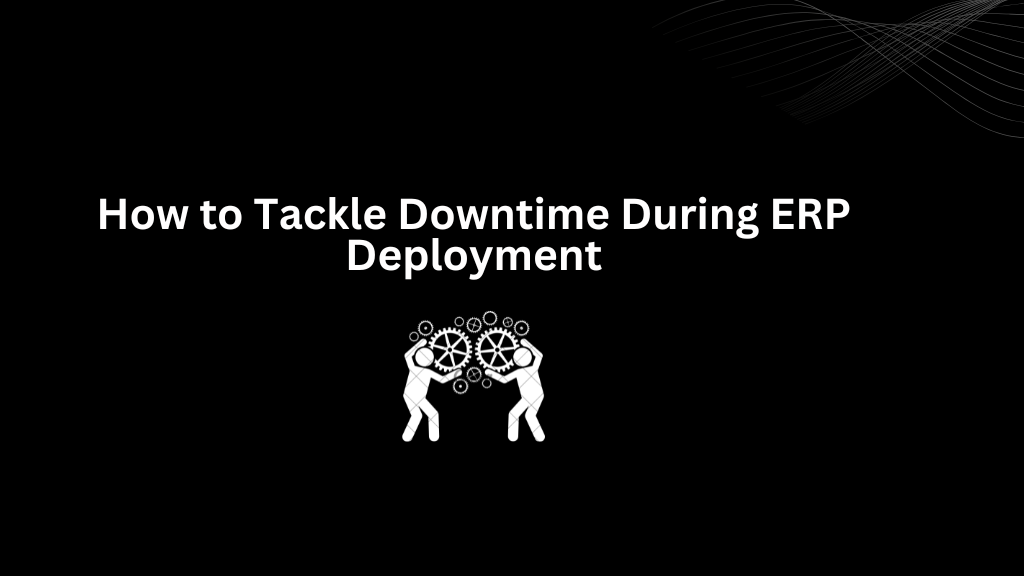Implementing an ERP (Enterprise Resource Planning) system is a significant step for any business aiming to streamline operations and improve efficiency. However, one common concern during ERP deployment is downtime. Downtime can disrupt your daily operations, affect productivity, and potentially lead to revenue loss. With the right strategies, businesses can minimize these disruptions and ensure a smoother ERP deployment process.
Understanding Downtime During ERP Deployment
Downtime refers to the period when systems or processes are unavailable due to the implementation or migration of the new ERP system. This is a critical phase where businesses might experience:
- Temporary halts in production or operations.
- Limited access to important data.
- Employee confusion or workflow disruptions.
Effective planning and execution can significantly reduce these challenges.
Tips to Tackle Downtime During ERP Deployment
1. Plan Thoroughly in Advance
Proper planning is the foundation of a successful ERP deployment. Identify potential risks, define clear timelines, and allocate resources effectively. A comprehensive plan ensures the process is organized and reduces unexpected delays.
2. Conduct a Detailed Pre-Deployment Assessment
Before implementing an ERP system, evaluate your current processes and systems. This includes:
- Mapping out workflows.
- Identifying critical operations that cannot afford downtime.
- Testing data migration processes.
This helps you anticipate challenges and prepare solutions in advance.
3. Choose the Right Deployment Strategy
The deployment approach can significantly impact downtime. Common strategies include:
- Phased Deployment: Rolling out the ERP system in stages to specific departments or functions.
- Parallel Deployment: Running the old and new systems simultaneously until the ERP is fully operational.
Both approaches allow businesses to test the ERP system while maintaining some level of functionality.
4. Train Employees Ahead of Time
One major cause of downtime is employee confusion during the transition. Conduct training sessions before the deployment so your team understands how to use the new ERP system. This ensures smoother operations once the system goes live.
5. Perform Rigorous Testing
Before making the ERP system live, perform extensive testing to identify and fix bugs or integration issues. This includes:
- System testing.
- User acceptance testing (UAT).
- Stress testing for performance under peak loads.
6. Schedule Deployment During Low-Activity Periods
Deploying the ERP system during non-peak hours or slow business periods minimizes the impact on operations. For example, weekends or holiday breaks are often ideal times for implementation.
7. Maintain Clear Communication
Keep your team informed about the deployment timeline, potential challenges, and contingency plans. Transparency reduces uncertainty and helps employees prepare for temporary disruptions.
8. Have a Backup Plan
Even with the best planning, unexpected issues can arise. Develop a contingency plan to address problems quickly, such as having IT support on standby or maintaining access to critical functions via the old system.
Benefits of Managing Downtime Effectively
By minimizing downtime during ERP deployment, businesses can:
- Maintain productivity levels.
- Prevent revenue loss.
- Ensure a smoother transition to the new system.
- Increase employee and customer satisfaction.
Why Choose 3techno for ERP Solution & Implementation
At 3techno, we understand the complexities of ERP deployment and the importance of minimizing downtime. Our expert team provides:
- Comprehensive planning and assessment.
- Tailored deployment strategies to fit your business needs.
- Rigorous testing and employee training.
- Post-implementation support to ensure your ERP system runs smoothly.
With years of experience in ERP solutions and implementation, 3techno is committed to delivering seamless transitions that help businesses thrive.
Ready to implement an ERP system without disrupting your business operations? Contact 3techno today to learn how we can help you achieve a smooth and efficient deployment process.

